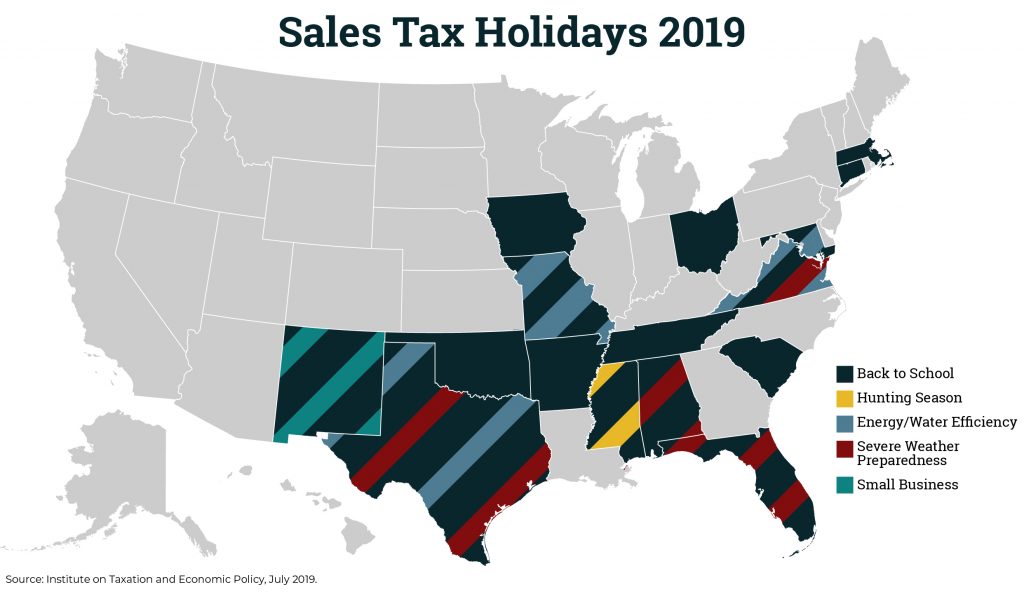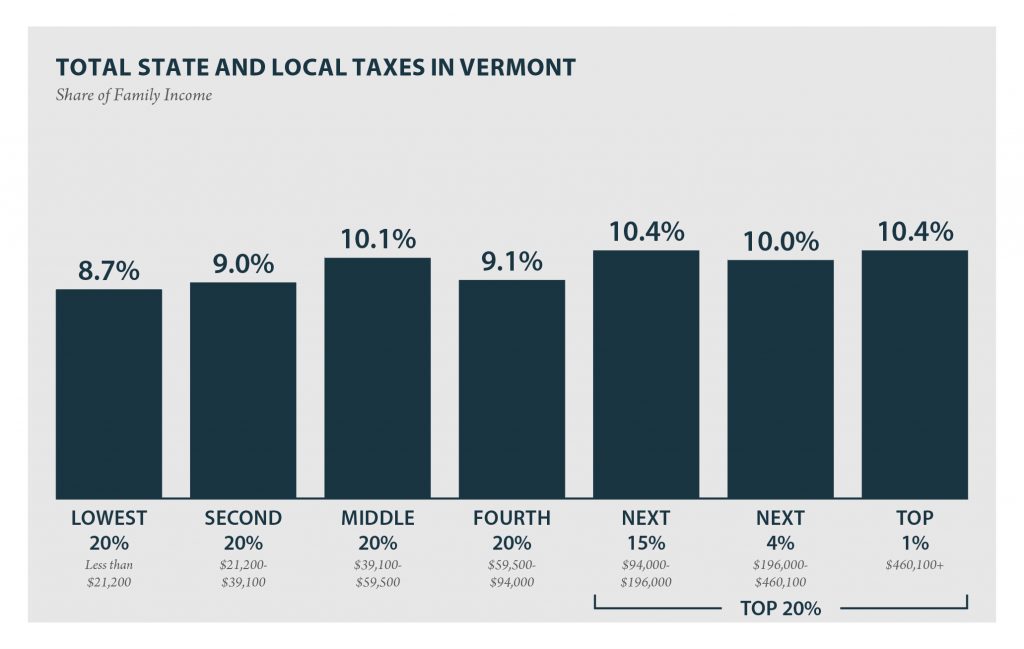Over the last couple of weeks, leaders in Kansas and Missouri reached a historic agreement to stop giving away tax subsidies just to entice companies a couple of miles across their shared state line. Meanwhile, policymakers in Alaska resolved a stand-off over education funding…by cutting education funding slightly less. And California voters may be voting in 2020 on a stronger reform to the notoriously inequitable property tax effects of “Proposition 13.”
— MEG WIEHE, ITEP Deputy Director, @megwiehe
Major State Tax Proposals and Developments
- ALASKA lawmakers and Gov. Michael Dunleavy have reached an agreement to slash state funding for the university system by about 20 percent over three years, which is considered by many to be a victory compared to the governor’s proposed cut of more than 40 percent all at once. This is only part of the funding cuts advocated by supply-side “mercenary” Donna Arduin, who has been working to impose these cuts despite the devastation they caused in Kansas under her mentor Arthur Laffer’s [mis]guidance. Some in the state are already working to recall Dunleavy over his efforts to de-fund vital public services. — DYLAN GRUNDMAN
- A referendum to reform CALIFORNIA Prop. 13 in November 2020 is undergoing some revisions. Under the revised initiative, commercial and industrial properties will be assessed differently than residential properties, will not be subject to existing assessment limitations, and will face assessment more regularly (currently they are only reassessed when properties change ownership). By strengthening the measure, proponents hope to increase its chance of success at the ballot in the fall. — LISA CHRISTENSEN GEE
- Leaders in KANSAS and MISSOURI have made history by agreeing to a tax-subsidy cease-fire meant to end years of poaching companies from each other through destructive race-to-the-bottom tax cuts. ITEP’s Matt Gardner wrote on the deal a few weeks ago here.
State Roundup
- Advocates for legalizing and taxing cannabis in ARIZONA have released the details of the ballot measure they’ll be supporting for the 2020 ballot.
- With the return of the school year, several states have offered sales tax holidays these past few weeks, including ARKANSAS, MASSACHUSETTS, OHIO, OKLAHOMA, NEW MEXICO, and TEXAS. But other states have newly opted out, such as WISCONSIN, where Gov. Tony Evers opted to not continue his predecessor’s newly instated tax holiday. Read up on why sales tax holidays are a widespread but misguided policy in ITEP’s brief here.
- In the wake of more mass shootings, a CALIFORNIA lawmaker is proposing a $25 excise tax on the sale of handguns and semiautomatic weapons. A similar bill died in committee this past May. The lawmaker intends to amend the bill to add an excise tax on the sale of ammunition and with an urgency clause that would allow the entire chamber to consider the legislation even if it doesn’t make it out of committee. Money from the new revenue would help fund the California Violence Intervention and Prevention Grant Program.
- A lawsuit has been filed in CALIFORNIA against the state’s Department and Tax and Fee Administration claiming the state has failed to comply with the law to collect sales taxes from Amazon fulfillment centers in the state.
- As lawmakers in COLORADO are reviewing the state’s tax exemptions, they should be sure look closely at programs that may not amount to much on a per-exemption basis but that can really add up collectively and over time—such as the state’s Enterprize Zone program.
- CONNECTICUT’s plastic bag tax took effect at the beginning of August, and some stores are already discontinuing the bags.
- With few alternatives, voters in five IOWA communities approved local sales tax increases to help fund public safety, parks, libraries, and property tax reductions, even though the taxes will fall predominantly on low- and middle-income families.
- Taxes from online sales are coming soon to KANSAS. Kansas’s policy in particular is drawing attention because it doesn’t include an exemption for small businesses under a certain income threshold as did the South Carolina law evaluated by the Supreme Court in Wayfair. Expect to see more action on this in the future!
- While a modest budget surplus in LOUISIANA has conservative lawmakers agitating for tax cuts, others weigh in on why surpluses are a better signal of fiscal health for the state.
- A new report from Policy Matters OHIO shows that taxpayers in the top one percent are the ones on average receiving a tax cut from recent tax policy changes—including eliminating income taxes for making under $21,750 a year, increasing the gas tax, taxing online sales, and changing the state’s exemption for business pass-through income—whereas those with low and middle incomes either see barely any change at all or even a slight tax increase.
- PENNSYLVANIA lawmakers are moving forward with efforts to draft a plan for how the state can eliminate property taxes while still funding education in the state. Proposals floated so far include taxing retirement income and expanding the sales tax base to services.
- After touring the state to get input from townhall meetings, members of the UTAH tax reform task force are expected to soon start pulling together specific reform proposals. Anticipated policies include extending the sales tax to some (but not a comprehensive set of) services, eliminating the sales tax on food, and removing the constitutional earmarking of revenue from the personal income tax for solely education funding.
- New data released from the VERMONT Department of Taxes shows evidence of growing income inequality in the state, with incomes in the bottom 10 percent declining and incomes for those with over $1 million growing by more than 70 percent compared to 2010. Fortunately state and local taxes are not contributing to income inequality in Vermont, but there are tax policy changes that could be utilized to reduce those disparities, such as eliminating tax breaks for capital gains income.
What We’re Reading
- Credit agencies are taking note of the financial risks states face from environmental catastrophes due to climate change.
- Fortune 500 corporations like Amazon aren’t the only entities that get by without paying significant taxes. Many non-profit organizations—including many that look and function more like for-profit firms—also benefit substantially from tax exemption policies that keep their tax bills low and their local communities strained for cash. The SFGate explores how this issue plays out in the Bay Area.
- With ALASKA policymakers making budget cuts to pay for tax credits for the oil and gas industries, some are wondering if the Kansas tax experiment has some lessons to offer the Last Frontier. The Kansas Center for Economic Growth thinks so, offering the advice via social media: “Don’t do it.”
- At the start of new fiscal years in most states, Pew reports on the economic growth states have experienced (albeit at different rates) since the Great Recession.
- New polling on public education funding highlights the fundamental challenge in the provision of public goods—taxpayers believe that funding for K-12 services is too low and support spending increases but are not willing to pay more in taxes from sustainable funding sources in order to make that happen. We feel your pain, public educators.
- Could new ethic codes for finance officers of local governments help shift public support for taxes? One Governing contributor thinks so.
- In the world of excise taxes: Big Soda has been working to preemptively prohibit local sales taxes on sugary drinks, including surprising successes in states like California. And in western Europe, the concept of a red meat tax is gaining momentum, in response to concerns about health as well as climate change.
- Here’s a read offering insights from a behavioral scientist on some of the reasons behind common anti-tax sentiments and some of the special interests that agitate those feelings in order to benefit economically and/or politically.
If you like what you are seeing in the Rundown (or even if you don’t) please send any feedback or tips for future posts to Meg Wiehe at [email protected]. Click here to sign up to receive the Rundown via email.





